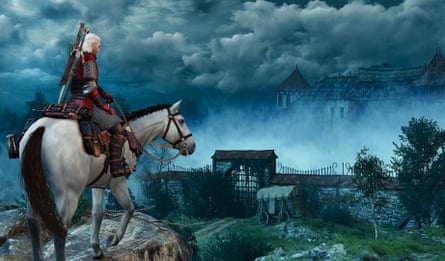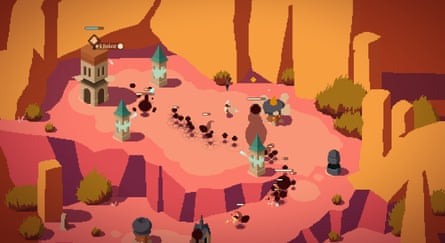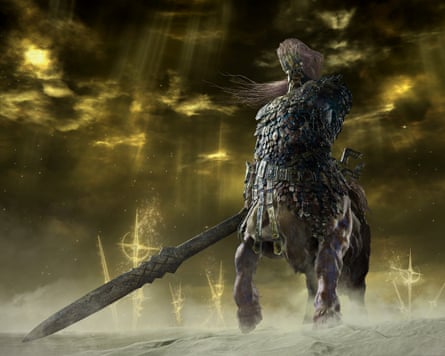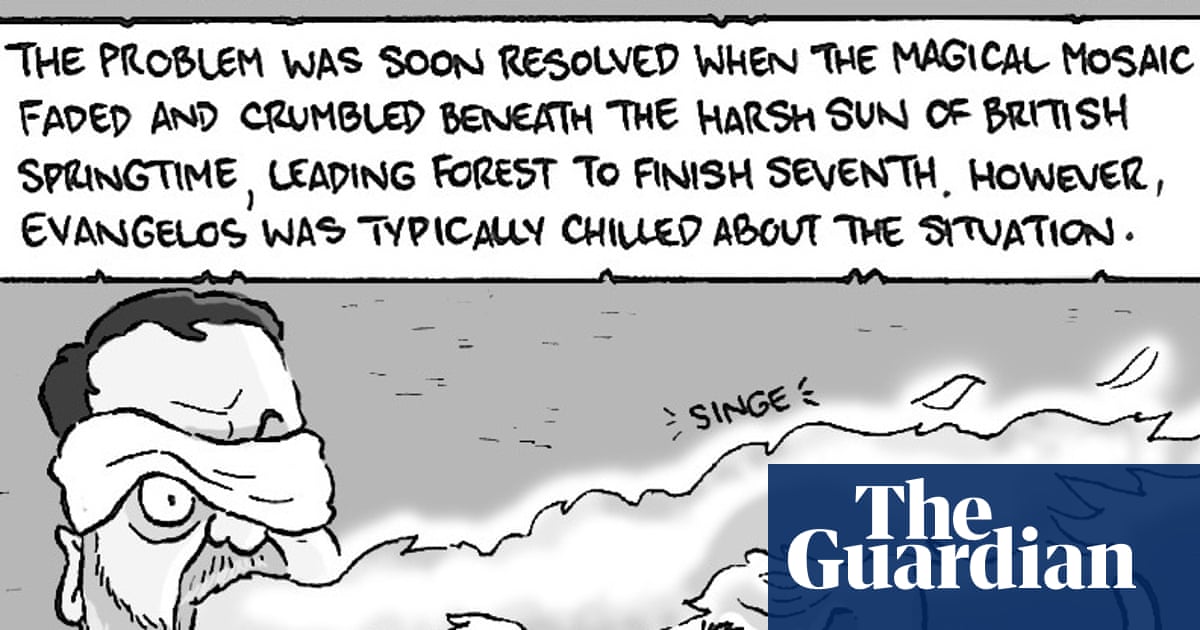Last week, the Guardian spoke to the team behind Lili, a video game retelling of Macbeth, shown at the Cannes film festival. The headline quote from the piece was “Shakespeare would be writing for games today”, which I have heard many times, and does make a lot of sense. Shakespeare worked in the Elizabethan theatre, a period in which plays were considered popularist entertainment hardly worthy of analysis or preservation – just like video games today! The authorities were also concerned about the lewd and violent nature of plays and the effect they may have on the impressionable masses – ditto!
But if we agree that a 21st-century Shakespeare would be making games, what sort would he be making? If our central thesis is that Shakespeare would be interested in mass, popular entertainment, then – if we’re talking pure revenue – he would be making casual smartphone games: Tencent’s multiplayer arena battle game Honor of Kings, for example, made $2.6bn (£1.9bn) last year. However, while the Bard was certainly interested in royalty and honour (and making money), it’s hard to see Hamlet working as a multiplayer arena-based online battle game structured into an endless series of fast-paced skirmishes. Our titular hero would barely get out the words, “O, that this too too solid flesh would melt, thaw, and resolve itself into a dew!” before being vaporised in a scorching barrage attack. For similar reasons, I can’t see Shakespeare making battle royale games such as Fortnite because, while he certainly liked a battle and lots of deaths, there’s not a lot of room for narrative complexity or rousing military rhetoric when the sole aim is to shoot as many people as possible while dressed as a giant banana or Sabrina Carpenter.
No, I think if Shakespeare was magically reincarnated in the first quarter of the 21st century, there is only one genre he’d be working in: the open-world role-playing adventure. Here, he’d have the time and space to weave complex narratives involving dozens of characters and diverse environments. King Lear’s moors would become a desolate explorable wasteland, much like the post-apocalyptic hellscapes of Fallout or Death Stranding; Macbeth’s castle would resemble the haunted dungeons of Elden Ring or The Witcher 3; the Verona of Romeo and Juliet would be a beautiful, troubled take on GTA’s Los Santos. Shakespeare’s major thematic obsessions – war, revenge, madness and the nature of free will – are all major elements in fantasy RPGs; his ability to weave in all classes, from the lowest peasants to the most vainglorious kings, is reflected in the social strata of the great open-world titles. Shakespeare’s histories mixed real-life and fictional characters, as does the Assassin’s Creed series, titles that are also interested in the classic Shakespearean concerns of identity, disguise and illusion.

More broadly, open-world games have the same sort of freewheeling structure and psychological flexibility as Shakespeare’s plays. They have subplots and side quests, they have nonlinear timelines and complicated, morally ambiguous characters; they are expansive and baggy, and wide open to varied interpretation. Vitally, open-world games let the spectator into the narrative as a viewer and an actor; similarly Shakespeare wanted his audiences to be drawn into the action, using asides, quips and monologues to break down the divide between stage and pit. Loud, opinionated and combative, video game players have much more in common with Shakespeare’s Elizabethan audiences than polite modern theatregoers.
This potential intersection between Shakespeare and open-world games is quietly gaining traction. A few years ago the RSC employed three artists to consider the interplay of live theatre with technology and one of them, the digital artist Adam Clarke, tested ideas for hosting Shakespeare performances within Minecraft. More recently, we saw the brilliant documentary Grand Theft Hamlet about an attempt to stage Hamlet within Grand Theft Auto during the Covid lockdowns. What, after all, is an open-world online video game if not a technological rendering of Shakespeare’s fundamental philosophy: all the world’s a stage, and all the men and women merely players.
What to play

It is always intriguing to see highly recognisable video game genres getting clever reinterpretations. Rift Riff by Dutch game designer Adriaan de Jongh and his small team is a tower defence game like, say, Plants vs. Zombies, except here the landscape is much more open and there are little tactical additions, such as being able to lay down the foundations for new towers before you have gathered the required resources to build them, which makes planning fun and creative. Add in the lovely, inviting visuals and sound effects and you have a captivating strategy sim suitable for newcomers and veterans alike.
Available on: PC
Estimated playtime: 15-plus hours
What to read

-
Writer, director and video game fan Alex Garland has been confirmed to helm a forthcoming live action movie adaptation of Elden Ring, produced by A24 and Bandai Namco. If it’s going to be authentic, the first two hours of the film will revolve around the lead character being repeatedly slaughtered by the Tree Sentinel knight at the very start of the quest.
-
Pac-Man is now officially 45 years old and the BFI has a piece tracing the evolution of the game from that old story about the pizza to the fact that all the ghosts have different personalities. Ms Pac-Man is a better game, though.
-
Game design luminary Peter Molyneux recently held a Q&A session at the Nordic Game 2025 conference, and gaming news site GI.biz wrote up his excellent answer to the question, whatever happened to Project Milo? And frankly, if you have to ask what that is, you’ll never know.
-
I am poring over Hurt Me Plenty, a lavish coffee table book about the best shooter games of the noughties, published by Bitmap Books. Call of Duty 4: Modern Warfare, Half-Life 2 and Unreal Tournament are all analysed here, as well as lesser-known oddities. (Codename: Nina – Global Terrorism Strike Force anyone?) A fascinating overview of this foundational period for modern shooter design.
What to click
-
Fortnite returns to iPhone app store in US, ending exile imposed by Apple
-
Hello Stranger – interactive thriller puts remote worker in trial-by-internet | ★★☆☆☆
after newsletter promotion
Question Block

This one came to us from Andy on email who asked:
What’s the strangest game you have ever played? Last year I played Harold Halibut on Game Pass, which I think is probably the weirdest game I’ve ever experienced. I’d love to hear about other strange gaming experiences.
I’ve played a lot of games that are famously weird, such as Seaman (look after a talking fish with the voice of Leonard Nimoy), Mister Mosquito (you’re a mosquito) and Katamari Damacy (you’re making giant balls of junk for the king of the universe), but I’ve also played many more obscure weird games, such as Spectrum classic Fat Worm Blows A Sparky (you’re a microscopic worm trapped in your own computer), the bizarre Amiga adventure Tass Times in Tonetown (you’re trapped in an alternative 1980s punk dimension) and the PlayStation 2 voyeur sim, Polaroid Pete (you’re a photographer trying to take snaps of weird things happening in local parks).
My favourite is Sega’s Emergency Call Ambulance, which is like Crazy Taxi except you’re driving an ambulance with a critically ill patient in the back and if you get into too many collisions you have to give them CPR or they die. This was a big arcade release, but somehow never made it to home consoles. I simply cannot understand why.
If you’ve got a question for Question Block – or anything else to say about the newsletter – email us on [email protected]

.png) 3 months ago
53
3 months ago
53

















































